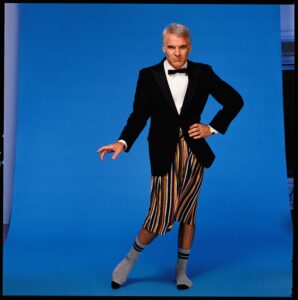Elba and Swinton fantasy: Three stars


George Miller followed Happy Feet Two, a musical cartoon sequel about dancing penguins, with Mad Max: Fury Road, a magnificently unhinged science-fiction action extravaganza, so perhaps it makes sense that he should have changed gears again for his latest release, which premiered at the Cannes Film Festival. Adapted from AS Byatt’s novella, The Djinn in The Nightingale’s Eyes, Three Thousand Years of Longing is a sincere, thoughtful romantic fantasy about a literature professor and a djinn (genie) having a conversation. Whatever Miller’s fans might have been expecting of him, they weren’t expecting that.
More like this:
– Top Gun 2: Better than the original
– Men is ‘playful, loose and eccentric’
– The greatest Marvel movie ever made?
Dr Alithea Binnie, played by Tilda Swinton with a northern accent and school-marmish glasses, specialises in “narratology”, which sounds like an academic field made up for The Da Vinci Code, but is actually the study of narrative structure. She is at a conference in Istanbul when she buys a stripy glass bottle from a shop in the Grand Bazaar, and then polishes it with her electric toothbrush in her hotel room. Before she can say “Aladdin”, a djinn appears, as played by Idris Elba with pointed ears and furry legs – and once you see Elba towering over Swinton, with his rumbling voice and his sweet mixture of authority and self-doubt, you can’t picture anyone else in the role.
He offers to grant her the traditional three wishes, but Alithea – who is oddly unfazed by this turn of events – has read enough books to know that djinns can be tricky and that wishes can be dangerous, so she won’t commit herself until they have sat in their white fluffy dressing gowns and got to know each other. As she listens, he recalls the previous times he was released from his bottle, and the film flashes back to various yarns about foolish sultans, angry princes and wily concubines through the centuries. The djinn, it transpires, repeatedly gets into trouble by trying to help women. Will Alithea be one of them?
Three Thousand Years of Longing is bound to gain a cult following among literature students, fairy-tale buffs, and anyone who sees themselves as being as geeky and emotionally cut-off as its determinedly single heroine. (As the title suggests, one of the film’s main themes is the desire to love and be loved.) For everyone else, it’s reassuring that such an eccentric and personal passion project exists – and with a largely non-English-speaking cast, to boot. You can file it alongside the Wachowskis’ adaptation of Cloud Atlas, or one of Terry Gilliam’s later works, as pleasing evidence that an auteur can still sometimes make an extravagant exotic fantasy with an indie sensibility.
Three Thousand Years of Longing
Directed by: George Miller
Starring: Idris Elba, Tilda Swinton
Length: 1 hour 48 minutes
Production company: Kennedy Miller Mitchell, FilmNation Entertainment, Metro-Goldwyn-Maye
Much like Alithea, though, most viewers will sit quietly, pondering and questioning the djinn’s stories, rather than being swept away by them. The scenes set in gilded palaces can be gloriously colourful, but the rudimentary CGI would have looked cheap a decade ago. The talky, episodic structure isn’t exactly urgent, either. There is no pressing need for the duo to finish their hotel-room symposium, so you have to wait and wait for the djinn to get to the point and for the professor to make her wishes. And despite Alitha’s suspicions, the big galoot never seems interested in deceiving or seducing her, so there is no tension to speak of. One issue here could be that while the djinn comes across as a soulful human being, the professor comes across as a cartoon boffin.
The lack of momentum gets more problematic in the London-set final act. The film keeps fading to black and then restarting, leaving the impression that Miller couldn’t decide on how to end it. Whatever it is that Mad Max uses to fuel his cars, Three Thousand Years of Longing could have done with some of it.
The fundamental problem, though, is that the djinn’s anecdotes just aren’t enchanting enough. They are sprinkled with wonderful little details, such as a magical musical instrument that plays itself, but none of them has compelling characters or a satisfying pay-off. It’s a strange flaw for a film which is so marvellously imaginative in so many ways, but that’s what it comes down to. If a screenplay is going to be fixated on the history and purpose of storytelling, the stories within it have to be better.
★★★☆☆
Three Thousand Years of Longing premiered at the Cannes Film Festival
Love film and TV? Join BBC Culture Film and TV Club on Facebook, a community for cinephiles all over the world.
If you would like to comment on this story or anything else you have seen on BBC Culture, head over to our Facebook page or message us on Twitter.
And if you liked this story, sign up for the weekly bbc.com features newsletter, called The Essential List. A handpicked selection of stories from BBC Future, Culture, Worklife and Travel, delivered to your inbox every Friday.














